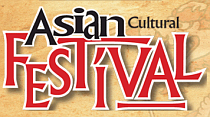2007年VOA标准英语-Asian-Americans Celebrate Diversity While Maint(在线收听)
New York
25 April 2007
The Asian Cultural Festival celebrates and explores the multi-cultural, multi-lingual, and multi-dynamic Asian-American experience. Where better to host such a festival than in Queens, New York - the most ethnically diverse county in the United States. From VOA's New York Bureau, Mona Ghuneim has the story.
 |
The weeklong festival, being held for a second year in a row, provides a stage for Asians and Asian-Americans to express their differences, and similarities.
Vivian Chiu, who grew up in Taiwan, is the festival's director. She says the events are different in content, execution and even technical direction. But they share the same artistic vision, to break stereotypes and move from the confines of what is expected. Asian performance art, she says, is not the dragon-ladies, submissive women, and Kung-fu fighters often portrayed in films and advertisements.
"In each event, there's collaborating efforts between artists of different cultural backgrounds," she said. "For Ping Chong's 'Undesirable Elements', we have a [Chinese] poet, we have a Korean trans-gendered woman, and also we have an Indian business founder. So they come from very different, diverse cultural backgrounds and also different industries."
Chiu selected a variety of acts ranging from contemporary, Eastern-infused dance by a Taiwanese troupe to a performance of spoken word, hip-hop and acoustic soul by a group of Asian-American artists.
Ping Chong's theatrical piece, "Undesirable Elements," is a compelling compilation of real people telling stories of cultural identity.
Here a Korean trans-gendered woman relates how she and her brother, adopted by an American couple when they were two young boys, were often misunderstood.
MAN: "1970 - December 7, 1970"
KOREAN WOMAN: "My brother and I are the only non-white children in our school, and in our neighborhood. Most families in our community have relatives who served in World War II, like our father did. Every year I dread Pearl Harbor Day. Every year, other children will taunt us, call us names and throw things at us. The fact that we're Korean, and not Japanese, does not matter."
The artists and organizers of the festival say they want audiences to experience the broad spectrum of Asian art and culture.
Rohi Mirza Pandya is a writer and director of South Asian heritage. She is the producer of 7-Eleven Convenience Theater. The show is a series of seven eleven-minute plays set in a convenience store. Pandya says a lot of Americans have only one image of the convenience store owner, an Indian or Chinese man with a funny accent. The show, she says, turns stereotypes on their heads.
"I think when you see images in the media or on television of store clerks, they're always just one-dimensional, whereas we're doing stories that have depth and these characters have a whole story behind them," she explained. "So you don't really see that anywhere else."
The festival's location, at the Queens Theatre in the Park, is a key part of the program. Just as diverse and dynamic as the performances themselves, the borough of Queens is home to one of the most ethnically varied populations in the world. Almost half of its more than two million residents are foreign-born and about 138 languages are spoken, making Queens the most multi-lingual place in the United States.
Jeffrey Rosenstock, the executive director of the theatre, says the festival fills a gap in Queens, where about 19 percent of the population is Asian.
"We looked at the different demographics of the borough and the changing demographics of the borough and really felt that we wanted to reflect that, not just with the artists on our stage, but the audiences," he said. "We are a mainstream institution that has made a commitment to embrace the different cultures that represent our city and especially our borough."
Rosenstock says he hopes the festival brings the Asian and non-Asian communities together. Offering them a selection of show tunes sung by Asians who have performed on Broadway certainly seems like an entertaining way to build that bridge.